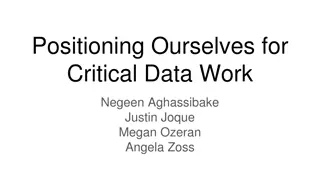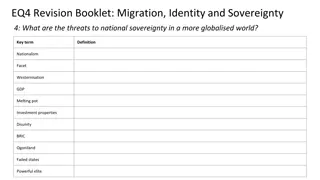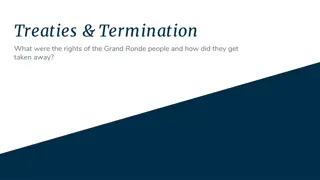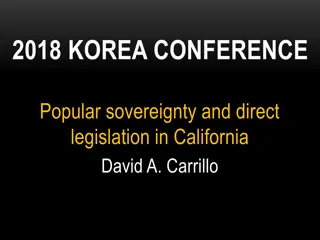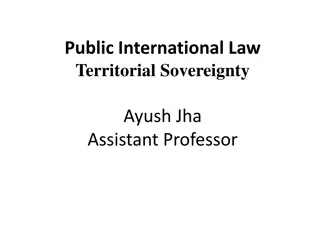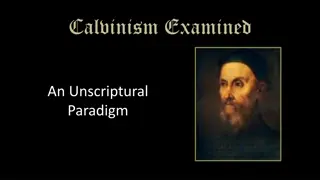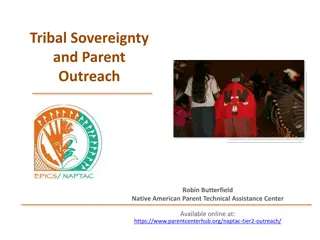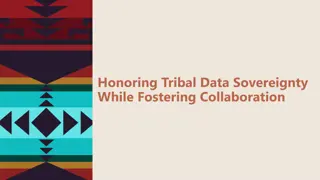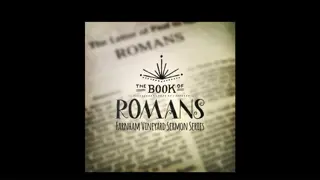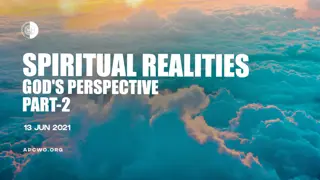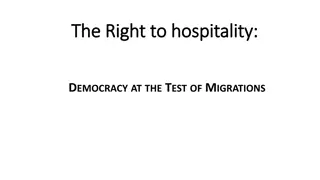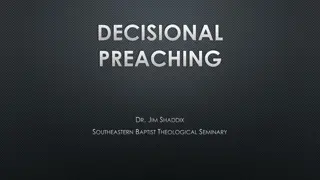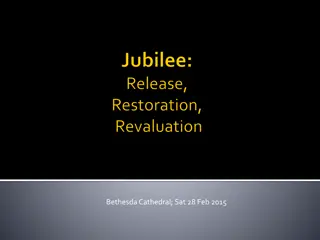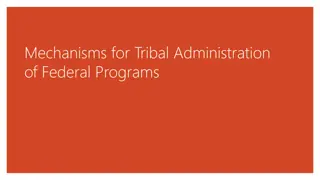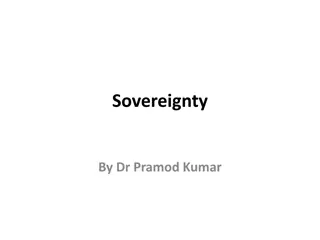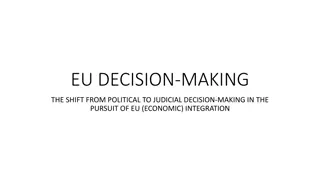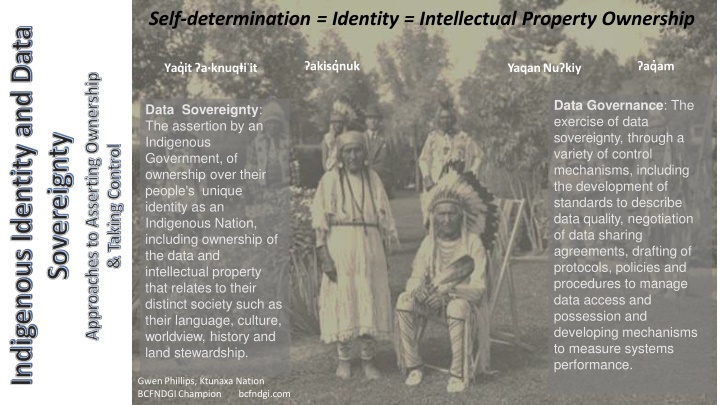
Indigenous Data Governance and Sovereignty in Nation Rebuilding Context
Explore the concepts of data governance and sovereignty within Indigenous communities, focusing on self-determination, intellectual property ownership, and the United Nations Declaration on the Rights of Indigenous Peoples, emphasizing the importance of maintaining control over cultural heritage and traditional knowledge to empower Indigenous Nations in rebuilding their identity.
Download Presentation

Please find below an Image/Link to download the presentation.
The content on the website is provided AS IS for your information and personal use only. It may not be sold, licensed, or shared on other websites without obtaining consent from the author. If you encounter any issues during the download, it is possible that the publisher has removed the file from their server.
You are allowed to download the files provided on this website for personal or commercial use, subject to the condition that they are used lawfully. All files are the property of their respective owners.
The content on the website is provided AS IS for your information and personal use only. It may not be sold, licensed, or shared on other websites without obtaining consent from the author.
E N D
Presentation Transcript
Self-determination = Identity = Intellectual Property Ownership akisq nuk aq am Yaq it a knuq i it YaqanNu kiy Data Governance: The exercise of data sovereignty, through a variety of control mechanisms, including the development of standards to describe data quality, negotiation of data sharing agreements, drafting of protocols, policies and procedures to manage data access and possession and developing mechanisms to measure systems performance. Data Sovereignty: The assertion by an Indigenous Government, of ownership over their people's unique identity as an Indigenous Nation, including ownership of the data and intellectual property that relates to their distinct society such as their language, culture, worldview, history and land stewardship. GwenPhillips, Ktunaxa Nation BCFNDGIChampion bcfndgi.com
DIRECTIONFROMRIGHTS HOLDERSIN NATIONALFORUMS Budget 2018 AFN RESOLUTION #57/2016 FUNDING FOR REGIONAL INFORMATION GOVERNANCE CENTRES Recognize Indigenous data sovereignty as a cornerstone of nation rebuilding and direct the federal government to fund the following: Engagement on data governance between First Nations leadership withineach region. The establishment of First Nation data governance champions in each region, identified by First Nations regions themselves. The development of fully functional regional First Nations information governmentcentres. Coordination of First Nations regions, data governance champions and national partners to establish a national First Nations data governance strategy. $2.5 millionto FNIGC to workwith its partners to begin thiswork. AFN RESOLUTION #42/2018 DATASOVEREIGNTY Reassert that First Nations livingin Canada maintain ownership and control over data that relates to their identity, their people, language,history, culture, communities and Nations, both historic and contemporary, and that each Nation willestablish regulations to govern their data, determininghow it will be managed,accessed and shared with other governments, organizations and/or individuals;and Callon the FNIGC to coordinate with support from the federal government, Statistics Canada,and the AFN regional processes to engage Budget2021 $51 millionto FNIGC and its partnersover 3 years, to: Begin implementation of the National Data Governance Strategy and developmentof Regional InformationGovernance Centres (RIGC)
IndigenousIntellectualProperty The primary purposes, as discussed in the Ktunaxa communities are: Protecting your identity Cultural identity belongs to the collective, irreducible to the individual. Protecting the foundation for innovation and adaptation No culture is static; our information must be the primary force in adapting changes to fit our protocols and practices. Protecting community creation Preserving resources meant for the entire community for the entire community not just locally famous personalities. Deeply integrated with your protocols to PROTECT your IDENTITY or COLLECTIVE PROPERTY, your LANGUAGE, your STORIES, your SONGS, your IMAGES, your SPIRITUAL CONCEPTS
UNITED NATIONS DECLARATION ON THE RIGHTS OF INDIGENOUS PEOPLES (UNDRIP) Indigenouspeopleshave the right to maintain, control, protect and develop their cultural heritage, traditional knowledge and traditional cultural expressions, as well as the manifestations of their sciences, technologies and cultures, including human and genetic resources, seeds, medicines, knowledge of the properties of fauna and flora, oral traditions, literatures, designs, sports and traditional games and visual and performing arts. They also have the right to maintain, control, protect and develop their intellectual property over such cultural heritage, traditional knowledge, and traditional cultural expressions.
UNDRIP Recognitionof IdentityOwnership Indigenous peoples have the right to practise and revitalize their cultural traditions and customs. This includes the right to maintain, protect and develop the past, present and future manifestations of their cultures, such as archaeological and historicalsites, artefacts, designs, ceremonies, technologies and visual and performing arts and literature. States shall provide redress through effective mechanisms, which may include restitution, developed in conjunction with indigenous peoples, with respect to their cultural, intellectual, religious and spiritual property taken without their free, prior and informed consent or in violation of their laws, traditions and customs. Indigenous peoples have the right to revitalize, use, develop and transmit to future generations their histories, languages, oral traditions, philosophies, writing systems and literatures, and to designate and retain their own names for communities, places and persons.
UNDRIP IdentityandNationhood Indigenous peoples and individuals have the right not to be subjected to forced assimilation or destruction of their culture. States shall provide effective mechanisms for prevention of, and redress for: Any action which has the aim or effect of depriving them of their integrity as distinct peoples, or of their cultural values or ethnic identities; Any form of forcedassimilation or integration; Indigenous peoples and individuals have the right to belong to an indigenous community or nation, in accordance with the traditions and customs of the community or nation concerned. Every indigenous individual has the right to a nationality.
RECOGNITION OF INDIGENOUS NATIONS AND INDIGENOUS GOVERNING BODIES Ownership and Control Measuring What Governance Matters Management Services Accessand Possession CULTURE = LANGUAGE AND LAND STEWARDSHIP
NATION TO NATION TO NATION BC First Nation (Indigenous) Governing Bodies Align with these Language Groups: Kwakw ala ing t Nedut en N x s ay m c n Nisga a N e kepmxc n Nsyilxc n Nuu aan u Nuxalk Oowekyala / Uikala P ntl Secwepemcts n SEN O EN / Malchosen / Lkwungen / Semiahmoo / T Sou-ke Anishnaubemowin Dakelh( ) Dane-Zaa ( ) | (N hiyaw win) Danez g Dene K e Diitiid aatx y7 7juuthem Gitsenimx She shashishalhem Ski:xs S wxw 7mesh sn chim Sm algya x St ti mcets T t n Tse khene Tsilhqot'in Witsuwit'en X aad Kil / X aaydaaKil (Haida) (N hiyaw win) enaksialakala/ a' islakala Hailhzaqvla Hul q umi num /Halq'em ylem / h n q min m Ktunaxa Sourced from First Peoples Cultural Foundation LANGUAGEIS A FOUNDATIONOF NATIONHOOD INDIGENOUSGOVERNING BODIESARE RECLAIMINGOWNERSHIP OVER IDENTITY AND INTELLECTUAL PROPERTY.
Recognitionof DataSovereigntyandDataGovernance The BC Office of the HumanRights Commissioner has recommended that Indigenous Data Governance be recognized in the Grandmother Perspective Report on DisaggregatedData Minister Miller has publicly stated that he recognizes Indigenous Data Sovereignty The Government of Canada has passed DRIPlaw The Government of BC has passed DRIPA Section 4 requires BC to develop an action plan to advance UNDRIP Sections6 and 7 enable the Province to enter into agreements with Indigenous governing bodiesregarding collaborative processes or shared decision-making The BC DRIPA Action Plan could advance government-to-government Data Quality and Sharing Agreements that recognize each Nation group s ownership of their intellectual property and right to control their data.
Report examined Indigenous-specific racism in health care, including a comprehensive presentation of data (recognized as collectively ownedby Indigenous Peoples of BC)AND concludes that: IN application of Indigenous data governance principles is a critical aspect of supporting the implementationof the UN Declaration current Indigenous data governance processes need to evolve to align with UNDRIP, and to produce required data in a more nimble and timely manner PLAIN SIGHT Recommends renewal of data governance and proper delegation by Indigenous Governing Bodies to institutions and new positions (e.g., Indigenous Health Officer) RECOMMENDATION #9 Indigenous data governance processes: Be developed with Indigenous institutions and governments in support of self-determination and sovereignty. Create clear protocols for access to information, including for Indigenous communities, the Indigenous Health Representative and Advocate, and Indigenous Health Officer. Accelerate the movement towards a vision of a Nation-governed and mandated regional data centre and alignmentwith the National Data Governance Strategy. Resultin renewal of the TDQSA to reflect the UN Declaration, align with the vision of a regional data centre, and to address recommendations provided in the TDQSA Rapid Review (February 2019).
BC DATAGOVERNANCE CENTER - CORE FUNCTIONS INDIGENOUS PEOPLES (NATIONS) OF BC - IntellectualProperty Ownership IGBs define what they want from their Data Center and how it will be governed ASSERTING DATAAND IP OWNERSHIP and CONTROL BC INDIGENEOUS (FN) GOVERNING BODIES: Data Sovereignty and Data Governance CENTREOVERSIGHT - MANAGING ACCESS BC DATACENTERGOVERNANCE BODY A Governance Body oversees the work of the Data Center under the authority delegated to them, by BC s FNGBs. They are accountable to BC FNGBs CENTRE OPERATIONS - POSSESSION BC DATACENTER Core functions: Protection of Intellectual Property StatisticalProduction Services Data Management Services Capacity Building Services As a FN public service agency, the Data Champion(s)andFirst Nations professionals serve IGBs. FIRST FIRST NATIONS DATA SOURCES LANDSCAPE NATIONS DATA USERS LANDSCAPE
Assertion of Each Nations Rights In order for DRIPA to take effect in BC, we have to stand ourselves up as the Indigenous Governing Bodies of each Nation group; the other governments cannot define who we are. We cannot let the other governments continue to lump us together as First Nations people; there are at least 34 unique groups of Indigenous peoples who have unceded rights and title in BC. As soon as we each replace the term, Indigenous people, with terms we know ourselves by,then the DRIPA and other legislation, like the Child Welfare Act and the federal Language Act, move from the abstract, to the concrete. The Indigenous Governing Bodies of each Nation group (linguistic) can, through a simple collective assertion, claim ownership over their unique identity as a distinct Indigenous group, ownership over your intellectual property and your population data. This is a statement that demands RECOGNITION by the other governments, so you can then set a table to advance RECONCILIATION and develop your own Nation-based DRIPA Implementation Plan. Working government to government, the Governing Bodies of 34+ Nation groups can set Nation-based tables through which to develop DRIPA Implementation Plans to address all matters, as per Community-defined priorities.
Example DRIPA Language to Guide Implementation Planning in BC Article 1 - Tsilhqot'in peoples have the right to the full enjoyment, as a collective or as individuals, of all human rights and fundamental freedoms as recognized in the Charter of the United Nations, the Universal Declaration of Human Rights and international human rights law. Article 2 - Tsilhqot'inpeoples and individuals are free and equal to all other peoples and individuals and have the right to be free from any kind of discrimination, in the exercise of their rights, in particular that based on the Tsilhqot'in peoples origin or identity. Article 3 -Tsilhqot'in peopleshave the right to self-determination. By virtue of that right they freely determine their political status and freely pursue their economic, social and cultural development. Article 4 - Tsilhqot'in peoples,in exercising their right to self-determination, have the right to autonomy or self- government in matters relating to Tsilhqot'in internal and local affairs, as well as ways and means for financing their autonomous functions. Article 5 - Tsilhqot'in peoples have the right to maintain and strengthen their distinct political, legal, economic, social and cultural institutions, while retaining their right to participate fully, if they so choose, in the political, economic, social and cultural life of the State. Article 6 - EveryTsilhqot'in individual has the rightto their Tsilhqot'in nationality
Intellectual Property and Data Sovereignty Todo list: Prepare a Declaration of Data Sovereignty (example shared)to inform the other governments and the world, of who your people are in relation to DRIPA, and in it: Identify your people as a distinct society with a unique language and identify the Governing Bodies who have authority to act on behalf of your people. Assert that you have the right to maintain, control, protect and develop your cultural heritage, language, traditional knowledge and traditional cultural expressions, as well as the manifestations of your sciences, technologies and culture, including but not limited to, human and genetic resources, seeds, medicines, knowledge of the properties of fauna and flora, oral traditions, literatures, designs, sports and traditional games and visual and performing arts. Assert that you also have the right to maintain, control, protect and develop your intellectual property over such cultural heritage, traditional knowledge, and traditional cultural expressions. Establish symbols and statements to be used by your Nation, in regards to IP Ownership. Give notice to the federal and provincial governments, that you intend to establish regulations through which to assert data sovereignty and develop processes to implement data governance and information management and that. Assert that you wish to establish a Community-driven, Nation-based DRIPA Implementation Plan and lay out your governments engagement and decision-making pathway(s). Develop an IP proposal and budget and submit to the federal governmentprogram and to the provincial government stating that you see this as an aspect of redress.
Ktunaxa Nation Declaration of Data Sovereignty The rights of Ktunaxa peoples, including those articulated in the United Nations Declaration on the Rights of Indigenous Peoples, are recognized in Canadathroughfederal and provinciallegislation. Through this Declaration, the Ktunaxa peoples, as a Nation of people who speak the Ktunaxa language, and who have a unique cultural identity, do assert thatwe are a distinctsociety thatis self-determiningand sovereign, with a rightto maintain,protectand develop the past,present and future manifestations of Ktunaxaculture and identity. This document is intendedto set the foundationfor the exercise of Ktunaxarightsin relationto Ktunaxadata and intellectualproperty. The Ktunaxa peoples collectively hold the rights to self-determination and self-government and these rights are asserted, at this time, throughthefollowing KtunaxaIndigenousGoverningBodies. KtunaxaGoverningBodies: Yaq it a knuq i itGovernment akisq nuk Government YaqanNu kiy Government aq am Government
KtunaxaGoverning Bodies are sovereign entities who have for millennia, worked together as the KtunaxaNationin advancingandprotecting Ktunaxainterests, rightsand title. Ktunaxa Governing Bodies commit to work together collectively as the Ktunaxa Nation, to assert data sovereignty and intellectual property rights on behalf of Ktunaxa people in order to protect the Ktunaxa identity and take ownership and control of the data that relates to Ktunaxa peoples. The Ktunaxa Governing Bodies assert ownership of Ktunaxa intellectual property and assert the right to maintain, control, protect and develop Ktunaxacultural heritage, language,traditional knowledge and traditionalcultural expressions, as well as the manifestations of Ktunaxa sciences, technologiesand culture, including but not limited to, human and genetic resources, seeds, medicines, knowledge of the propertiesof fauna and flora, oral traditions, literatures, designs, sports and traditional games and visual and performing arts and assert ownership over the datathatrelates to these expressions andmanifestations. Ktunaxa Governing Bodies assert ownership over Ktunaxa the data that relates to their peoples and their wellbeing; historic and contemporary Ktunaxa population data. Working together as the Ktunaxa Nation, Ktunaxa Governing Bodies will assume data governance and information management functions to support their Community Development and Nation Rebuilding activities, regulating access to and possession of Ktunaxadataand intellectualproperty.
KtunaxaGoverning Bodies commit to work together, government-to-government and Nation-to-Nationwith Canadaand British Columbia, to develop Tripartite Data Quality and Sharing Agreements and to develop a plan through which to fully implement Ktunaxa Nation data sovereignty,data governanceand information managementfunctions. KtunaxaGoverning Bodies commit to work together, government-to-government and Nation-to-Nationwith other First Nations Governmentsin B.C.towards a vision of every Nationachieving datasovereignty, in alignmentwith their own worldview. Ktunaxa Governing Bodies commit to work together with other Indigenous Governing Bodies in B.C. on a government-to-government and Nation-to-Nation basis, to collectively ensure ethical access to data to produce timely and frequent population and province-wide reports, to supportcomprehensive systems improvement and accountability. MADE THIS DAY OF , SIGNEDBY THE GOVERNING BODIES OF THE KTUNAXA NATION. Yaq it a knuq i itGovernment akisq nuk Government Yaqan Nu kiy Government aq am Government

